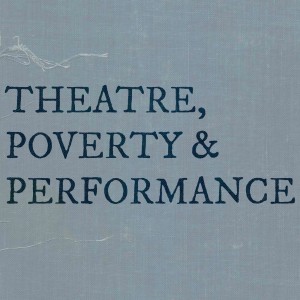Symposium
*** THE SYMPOSIUM TOOK PLACE ON 4th NOVEMBER 2015 – THANKS TO ALL 80+ ATTENDEES FOR YOUR CONTRIBUTIONS TO A STIMULATING DAY ***
MAKING THEATRE IN THE MIDST OF AUSTERITY
A one-day symposium on theatre, poverty and inequality
For an overview of the day, have a look at our ‘Making Theatre in the Midst of Austerity’ storify
To listen to audio recordings of presentations, go to the ‘Making Theatre in the Midst of Austerity’ playlist on the Poor Theatres You Tube channel
Watch a series of snapshot responses to the symposium filmed during the day:
View the programme here – Programme Outline
View the welcome note here – Welcome Note
View abstracts and biographies here – Abstracts and biographies
At the symposium, we launched our Theatre, poverty and economic justice free online resource. Read more here – Online resource flyer
Read a blog post about the symposium here
Programme and brief
Wednesday 4th November 2015, 9am – 6pm
Martin Harris Centre of Music and Drama, University of Manchester (UK)
Including evening performances of The House, a solo performance by Carran Waterfield, Triangle Theatre (3rd & 4th November, 7pm)
Keynotes:
Stella Duffy – co-director of the Fun Palaces campaign, theatre-maker and writer
John McGrath – Artistic Director, Manchester International Festival (formerly – founding Artistic Director, National Theatre Wales and Artistic Director, Contact Theatre, Manchester)
Reece Williams – Manchester based poet, peer mentor, workshop facilitator and theatre producer, working with Young Identity & Inna Voice Collectives
Deepening economic inequality has been identified as one of the most pressing issues of our time. A high profile briefing released by Oxfam in January 2015 reported that the concentration of power within an elite minority is creating widespread disenfranchisement and posing threats to social security. In the UK, an economic policy of austerity has featured cuts in public spending at levels unprecedented in the postwar period, as well as an increasingly punitive social welfare system.
How are theatre-makers responding to this moment? What methods and collaborations are being developed, and what new approaches are needed? Where might these come from? What theatre initiatives exist in sites affected by economic inequality? How can artists working in these localities operate responsively and creatively, recognising their complex, diverse and vital dimensions and resisting a ‘deficit’ model that constructs communities as lacking or in need?
Thus symposium will bring together theatre-makers, researchers and communities to share examples of practice and research that respond to economic inequality. The symposium will provide a platform for exploring how artists are making theatre in the midst of austerity, and, in turn, how theatre is being drawn on to engage communities struggling with its impact.
The intention is to stimulate ongoing exploration of themes arising from recent public discussions of inequality across the cultural sector. These discussions have focused on a range of issues, from the unequal distribution of public sector funding to the lack of socio-economic diversity amongst publics participating in the arts. There have also been interrogations of employment conditions for artists and limited opportunities to pursue careers in the arts for those from non-privileged backgrounds, as well as important debates about arts-led regeneration and the ‘gentrification’ of economically deprived areas.
Presentations will cover the following topics:
- Theatre in communities and sites affected by poverty and economic regeneration/gentrification
- Theatre and economic justice, for example theatre’s contributions to Occupy and commons projects
- The precarious economies of theatre production
- Exploitation and theatrical labour – infrastructures of support and pay for artists
- Poverty and precarity as a theatrical aesthetic
- DIY theatres
- Disruptive and/or critical modes of creative entrepreneurship
Further information
Evening performances of The House, a solo performance by Carran Waterfield (Triangle Theatre), will take place on 3rd and 4th November, 7pm. The House is inspired by historical sources relating to poor women in the Victorian workhouse and contemporary debates about poverty and welfare. It traces a series of real and imagined characters across narratives of destitution, institutionalisation, creativity and care over a period of almost 200 years. Drawing on the performer’s research into her own family’s engagements with social welfare systems dating back to the New Poor Law of 1834, The House is an ancestral epic that explores how poor women have developed techniques of self-presentation which reproduce, trick, exploit and expose the regulatory discourses that call them into appearance.
THE HOUSE RUNNING TIME IS 1 HOUR AND 15 MINUTES. THE PERFORMANCE WILL BE FOLLOWED BY A 30 MINUTE Q&A
Attendance at the symposium and performance is free of charge
This symposium is an outcome of an Arts and Humanities Research Council ECR Fellowship ‘Poor Theatres: A critical exploration of theatre, performance and economic precarity’, led by Dr Jenny Hughes.
For regular updates follow @PoorTheatres
@PoorTheatres #poortheatres
https://www.facebook.com/PoorTheatres

